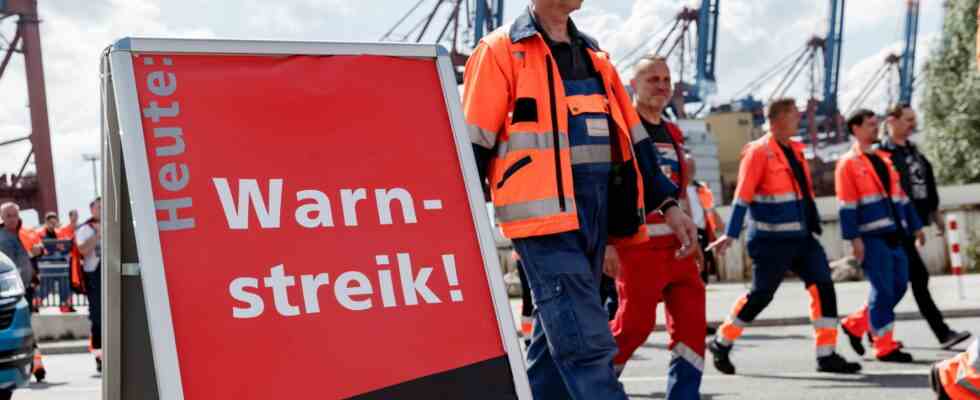Status: 07/13/2022 10:40 p.m
Once again, the port operators and the trade union ver.di could not agree on a compromise – the next warning strike by the port workers is expected to last 48 hours. This is likely to increase the delays in the ports.
There is still no sign of an agreement in the collective bargaining dispute over the wages of dockworkers in the German North Sea ports. This threatens Germany’s largest seaports to come to a standstill again – this time even for 48 hours. The ver.di trade union has asked employees to stop working from Thursday morning to Saturday morning.
The warning strikes affect all the important ports on the North Sea – in addition to Hamburg, the largest German seaport by far, also Bremerhaven, Bremen, Emden, Wilhelmshaven and Brake. The warning strike should begin at all locations with the early shift, said ver.di negotiator Maya Schwiegershausen-Güth.
Seven rounds of negotiations without a result
The Central Association of German Seaport Companies (ZDS) and ver.di had previously been unable to come to an agreement in a seventh round of negotiations lasting more than eight hours. Both sides are negotiating for around 12,000 employees in 58 collective bargaining companies in Hamburg, Lower Saxony and Bremen. The port workers had already paralyzed the handling of ships twice in June, most recently on June 23 for 24 hours.
ver.di came up with a package of demands which, according to its own statements, would mean pay increases of up to 14 percent over a period of twelve months, depending on the wage group. After several improvements, the ZDS recently put a “final offer” on the table, which the association puts at a volume of up to 12.5 percent for container companies and 9.6 percent for conventional companies, but with a term of 24 months.
Container congestion is likely to worsen
The effects of the warning strike on the handling of container and cargo ships are likely to be significant and the loading and unloading of ships will largely come to a standstill. This will exacerbate the already tense situation with a ship jam on the North Sea and the processes at the quay edges are likely to get even further out of step. ZDS negotiator Ulrike Riedel called the call for a strike “irresponsible” in view of the disrupted supply chains to the detriment of consumers and companies.
Due to the corona virus, there has been a lot of confusion in the global traffic of container and cargo ships for a long time. According to the latest calculations by the Kiel Institute for the World Economy, more than two percent of global freight capacity is stuck in traffic jams in the North Sea. Around 20 freighters are currently waiting to be dispatched at anchorages in the German Bight, most of them bound for Hamburg.

